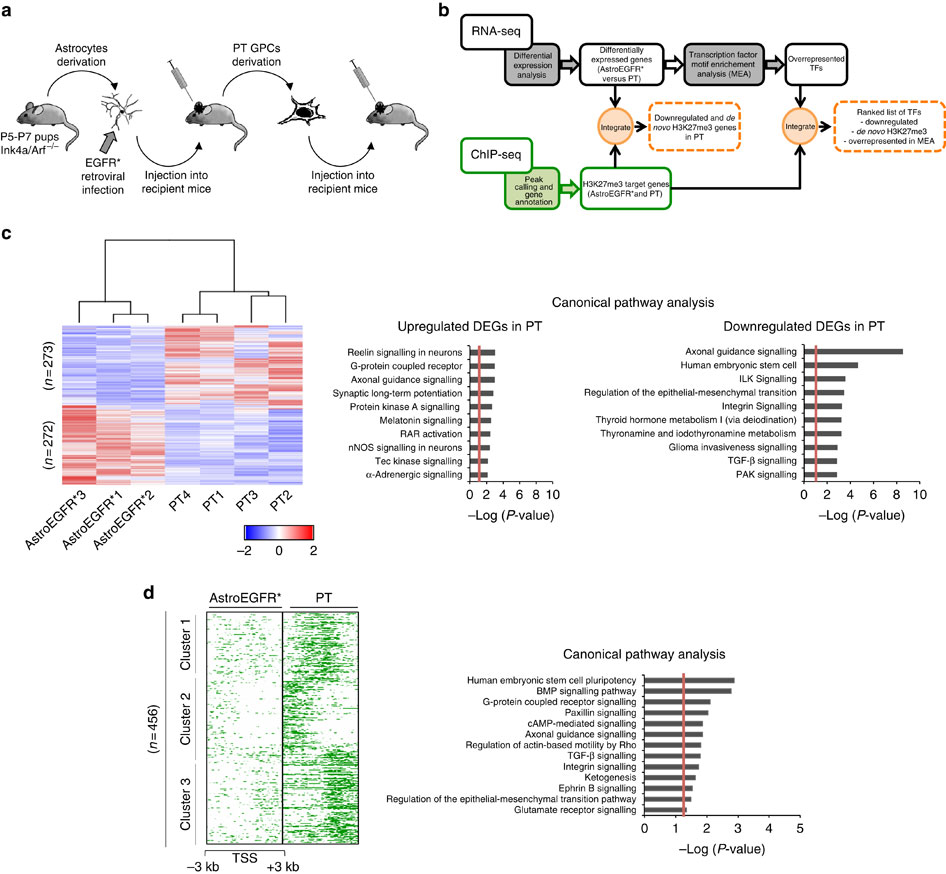当前位置:
X-MOL 学术
›
Nat. Commun.
›
论文详情
Our official English website, www.x-mol.net, welcomes your
feedback! (Note: you will need to create a separate account there.)
Polycomb dysregulation in gliomagenesis targets a Zfp423-dependent differentiation network.
Nature Communications ( IF 14.7 ) Pub Date : 2016-Feb-29 , DOI: 10.1038/ncomms10753
Elena Signaroldi 1 , Pasquale Laise 1 , Silvia Cristofanon 1 , Arianna Brancaccio 1 , Elisa Reisoli 2 , Sina Atashpaz 1 , Maria Rosa Terreni 3 , Claudio Doglioni 3 , Giancarlo Pruneri 4 , Paolo Malatesta 2, 5 , Giuseppe Testa 1, 6
Nature Communications ( IF 14.7 ) Pub Date : 2016-Feb-29 , DOI: 10.1038/ncomms10753
Elena Signaroldi 1 , Pasquale Laise 1 , Silvia Cristofanon 1 , Arianna Brancaccio 1 , Elisa Reisoli 2 , Sina Atashpaz 1 , Maria Rosa Terreni 3 , Claudio Doglioni 3 , Giancarlo Pruneri 4 , Paolo Malatesta 2, 5 , Giuseppe Testa 1, 6
Affiliation

|
Malignant gliomas constitute one of the most significant areas of unmet medical need, owing to the invariable failure of surgical eradication and their marked molecular heterogeneity. Accumulating evidence has revealed a critical contribution by the Polycomb axis of epigenetic repression. However, a coherent understanding of the regulatory networks affected by Polycomb during gliomagenesis is still lacking. Here we integrate transcriptomic and epigenomic analyses to define Polycomb-dependent networks that promote gliomagenesis, validating them both in two independent mouse models and in a large cohort of human samples. We find that Polycomb dysregulation in gliomagenesis affects transcriptional networks associated with invasiveness and de-differentiation. The dissection of these networks uncovers Zfp423 as a critical Polycomb-dependent transcription factor whose silencing negatively impacts survival. The anti-gliomagenic activity of Zfp423 requires interaction with the SMAD proteins within the BMP signalling pathway, pointing to a novel synergic circuit through which Polycomb inhibits BMP signalling.
中文翻译:

神经胶质瘤发生中的 Polycomb 失调以 Zfp423 依赖性分化网络为目标。
由于手术根除总是失败及其明显的分子异质性,恶性神经胶质瘤是医疗需求未得到满足的最重要领域之一。越来越多的证据揭示了多梳轴对表观遗传抑制的关键贡献。然而,对于神经胶质瘤发生过程中 Polycomb 影响的调控网络仍然缺乏一致的理解。在这里,我们整合转录组和表观基因组分析来定义促进神经胶质瘤发生的多梳依赖网络,并在两个独立的小鼠模型和大量人类样本中验证它们。我们发现胶质瘤发生中的 Polycomb 失调会影响与侵袭性和去分化相关的转录网络。对这些网络的剖析发现 Zfp423 是一种关键的 Polycomb 依赖性转录因子,其沉默会对生存产生负面影响。 Zfp423 的抗神经胶质瘤形成活性需要与 BMP 信号通路内的 SMAD 蛋白相互作用,这表明 Polycomb 通过该协同电路抑制 BMP 信号传导。
更新日期:2016-03-03
中文翻译:

神经胶质瘤发生中的 Polycomb 失调以 Zfp423 依赖性分化网络为目标。
由于手术根除总是失败及其明显的分子异质性,恶性神经胶质瘤是医疗需求未得到满足的最重要领域之一。越来越多的证据揭示了多梳轴对表观遗传抑制的关键贡献。然而,对于神经胶质瘤发生过程中 Polycomb 影响的调控网络仍然缺乏一致的理解。在这里,我们整合转录组和表观基因组分析来定义促进神经胶质瘤发生的多梳依赖网络,并在两个独立的小鼠模型和大量人类样本中验证它们。我们发现胶质瘤发生中的 Polycomb 失调会影响与侵袭性和去分化相关的转录网络。对这些网络的剖析发现 Zfp423 是一种关键的 Polycomb 依赖性转录因子,其沉默会对生存产生负面影响。 Zfp423 的抗神经胶质瘤形成活性需要与 BMP 信号通路内的 SMAD 蛋白相互作用,这表明 Polycomb 通过该协同电路抑制 BMP 信号传导。







































 京公网安备 11010802027423号
京公网安备 11010802027423号